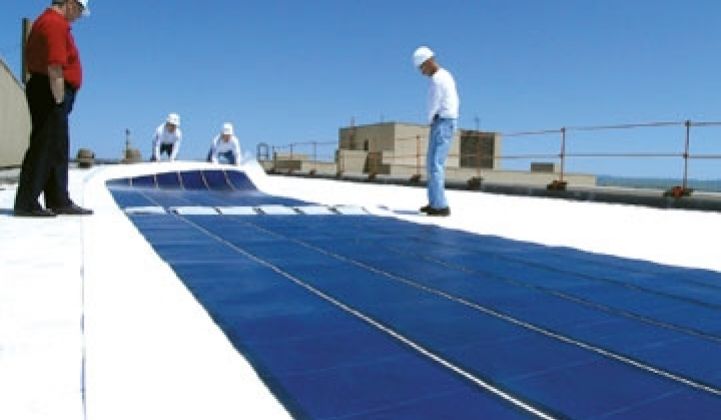A heavyweight is entering the solar roofing business.
Johns Manville, a Berkshire Hathaway company with 151 years of history, has inked a multi-year deal with Energy Conversion Devices (NDSQ: ENER) to buy flexible thin films made by ECD's subsidiary, United Solar Ovonic, that it will then incorporate into roofing materials.
The Denver-based company also created a new company called JM E3 Co. to market eco-friendly products for the commercial rooftop market. This could mean competition for people like Serious Materials and Aspen Aerogels, who have teamed up on energy efficient insulation, or Photosolar, which make integrated window films that repel solar heat. Manville already produces a myriad of insulation products for markets including aerospace, automotive and wind energy.
"Until now solar has not a great return on investments," said Sarah Tholen, a marketing and communications manager at Johns Manville. "With the economic stimulus package there are a number of drivers that make solar an attractive value proposition."
In the past, a return on investment for installing solar on rooftops could take 17 years, Tholen said. That window has shrunk to about six to seven years, she added.
Johns Manville's foray into solar roofing products reflects the growing interest in building-integrated solar products, which remain a tiny market with low-efficiency products.
Unlike many rooftop solar energy systems today that use solar panels with mounting systems, installing flexible solar thin films such as those made by Uni-Solar would require no roofing penetration or racks. That could shave installation costs and reduce the likelihood of leaky roofs and other problems. Integrated solar roofs also could be more aesthetically pleasing.
Makers of copper-indium-gallium-selenide (CIGS) thin-film are going after the commercial rooftop market, though many of them are in pre-commercialization stages.
Solyndra, in Fremont, Calif., seems to have made more progress in tackling the roofing market. Last November, CIGS thin film developer said it had signed a $320 million deal with roofing system maker Carlisle Construction Materials, which is based in Carlisle, Penn.
The deal with ECD marks the first commercial product launch for Johns Manville, which has considered adding solar energy generation systems to its lineup for several years.
Under the agreement, Uni-Solar would ship its thin films to Johns Manville's factory in Scottsboro, Ala., where they would be assembled into Johns Manville's thermalplastic polyolefin (TPO) roofing membranes, Tholen said.
Johns Manville also will offer another product that combines the thin films with its bitumen roofing offering, said Brad Burdic, group manager for owner services at Johns Manville. This product requires customization, so it's not an off-the-shelf solution like the one with TPO.
Bitumen systems are the oldest products for the roofing industry, Burdic said. But the newer TPO membranes account for the fastest growing segment, and they cost less, he added. TPO membranes also meet California's cool roof requirements.
California and New Jersey are two states that promise to be strong markets for the solar roofing products, thanks to strong state incentives for solar, Tholen said.
JM E3 plans to sell its new roofing products for the low-slope commercial roofing market, Tholen said. The company expects to see the first installations during the first half of 2010, she added. She declined to disclose the value of the company's contract with ECD.
Johns Manville opted for Uni-Solar's thin films because they are ready to be integrated into conventional roofing materials, even though those thin films aren't as efficient at converting sunlight into electricity as other thin films under development, Tholen said.
Uni-Solar uses amorphous silicon as the key ingredient for its thin films, which have about 6 percent to 7 percent efficiency.
"We are looking at more efficient products, including monocrystalline and multicrystalline silicon," Tholen said. "Generally, our interest would be in systems with very limited roof penetration."
Silicon solar panels are more expensive for integrating into roofing systems, she added. Most of them also are glass panels that require racks to support them.
There are companies such as Redwood Renewables that are putting crystalline silicon cells in roofing tiles, however (see Getting Solar Energy Cheap and Easy).
Image courtesy Johns Manville



